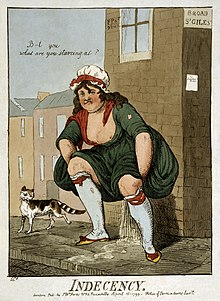
Inappropriateness refers to standards or ethics that are typically viewed as being negative in a society. It differs from things that are illicit in that inappropriate behavior does not necessarily have any accompanying legal ramifications.
Compendium

Synonyms of inappropriate include improper, unfitting, unsuitable and indecent. Although social ills are usually outlawed in wider society, there are many examples wherein various jurisdictions give their inhabitants full discretion over certain aspects of their lives so they can police themselves without any intrusiveness. For instance, although it's legal to flatulate in a crowded elevator, there are strong social pressures not to do so. Other socially contentious behavior, such as smoking while pregnant, may procure a statement from a public health organization rather than from a law enforcement organization. The term has also been used to negatively refer to the usage of recreational drugs. Increasingly, the term is used in the context of sexual misconduct, especially touching of erogenous zones such as the genitalia or sending photos of said private parts.
Regulation
In the United States, the Supreme Court has ruled in FCC v. Pacifica Foundation (1978) that the Federal Communications Commission has the power to punish constitutionally protected but "indecent" expression on radio and broadcast television. The FCC released guidelines on indecency in 2001. The radio and television broadcast of indecent material is prohibited between 6 a.m. and 10 p.m.
See also
References
- Encyclopedia of Special Education, Elaine Fletcher-Janzen - 2007, p 143
- Handbook of Social Psychology - Page 564, Amanda Ward - 2013
- Burtons Legal Thesaurus 5th Edition: Over 10,000 Synonyms, Terms, and Expressions Specifically Related to the Legal Profession, page 871, William Burton - 2013
- Policing Citizens: Authority and Rights - Page 31, P. A. J. Waddington - 1999
- Arthur, Robert (2012). You Will Die: The Burden of Modern Taboos. p. III.
- "Alcohol and smoking in pregnancy - nidirect". nidirect.gov.uk. 12 November 2015.
- Language and behavior - Page 169, Charles G. Russell - 1993
- Alagiakrishnan, Kannayiram, et al. "Sexually inappropriate behaviour in demented elderly people." Postgraduate medical journal 81.957 (2005): 463-466.
- Marjorie Heins (2007). Not in Front of the Children: 'Indecency,' Censorship, and the Innocence of Youth. Rutgers University Press. p. xvi. ISBN 9780813543888.
- Paul Ruschmann, Alan Marzilli (2009). The FCC and Regulating Indecency. Infobase Publishing. pp. 32–33. ISBN 9781438106236.
- Jeremy Lipschultz (2008). Broadcast and Internet Indecency: Defining Free Speech. Routledge. p. 189. ISBN 9781135596286.